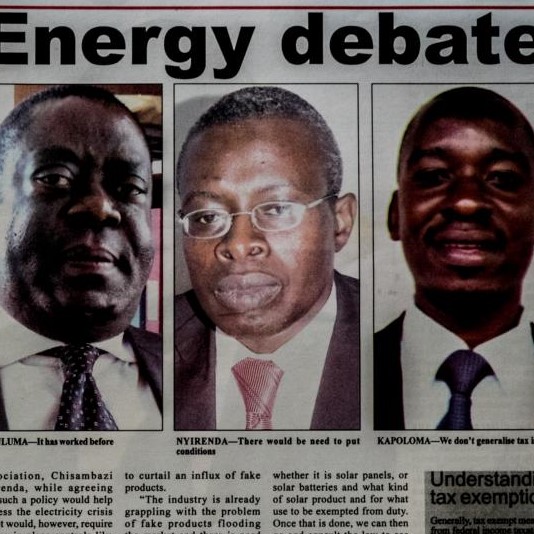
As the country is grappling with its worst electricity crisis in history, there are proposals for the government to consider putting tax waivers on solar products and generators to increase access to those products and lessen dependence on hydro-electric power.
For a long time, there has been a mismatch between demand for electricity and the capacity that is available for distribution and the situation has been made worse by declining water levels in Lake Malawi where the country taps water for hydro-electric power generation.
A tax expert, Emmanuel Kaluluma, who works as a Senior Consultant at EK Tax Consultants, said allowing people and companies to import energy products duty free would help ease the electricity crisis as such waivers would make the products more accessible to many people and in the process easing the pressure to accommodate everyone on the national power grid.
“This has worked before in the transport sector after government decommissioned its public transport service and allowed importation of big buses duty free. We have seen the fruits and how that decision revolutionalised the transport sector,” he said.
Kaluluma previously worked in different senior tax management portfolios including being Commissioner of the Customs and Exercise Division of the Malawi Revenue Authority as well as heading the Surtax Department in the Ministry of Finance.
He said the same policy is being implemented in the hospitality industry where players are allowed to bring certain products in the country duty free.
In a separate interview, President of the Solar Traders Association, Chisambazi Nyirenda, while agreeing that such a policy would help address the electricity crisis said it would, however, require putting in place controls like specifying that only duly registered businesses be allowed waivers for quality control and discipline to avoid an influx of sub-standard products on the market.
“It is a great idea as long as Malawi Energy Regulatory Authority registered solar businesses as the ones allowed to import such items and enjoy the waivers. This used to happen under the Barrier Removal to Renewable Energy in Malawi (Barrem) project,” he said.
Nyirenda, however, observed that while the Barrem project was a success, there would be need to refine and reinstitute some of the ideals that were being followed to curtail an influx of fake products.
“The industry is already grappling with the problem of fake products flooding the market and there is need to bring back sanity and professionalism with support from associations like the Solar Traders Association.
Mandatory membership to such associations should be one of the conditions for participating in certain tenders and projects,” he said.
When contacted for comment, Malawi Revenue Authority publicist, Steven Kapoloma, said proponents of the idea need to develop specifics, such as indicating what kind of solar products or generators should be exempted from tax instead of putting a general tag on the products to qualify for waivers.
“Taxation does not generalise. We need to be told whether it is solar panels, or solar batteries and what kind of solar product and for what use to be exempted from duty. Once that is done, we can then go and consult the law to see what provisions are available before implementing,” he said.
Economic commentators have been faulting government for misplaced priorities and failing to give priority to addressing energy challenges that have crippled business growth and now pose as a disincentive to investment.
Currently, the country is only able to generate less than three quarters of the full installed capacity of electricity, which is pegged at 351 megawatts. This is against demand estimated at 360 megawatts.
A recent report released by United Nations Conference on Trade puts access to electricity at below 20 percent.
